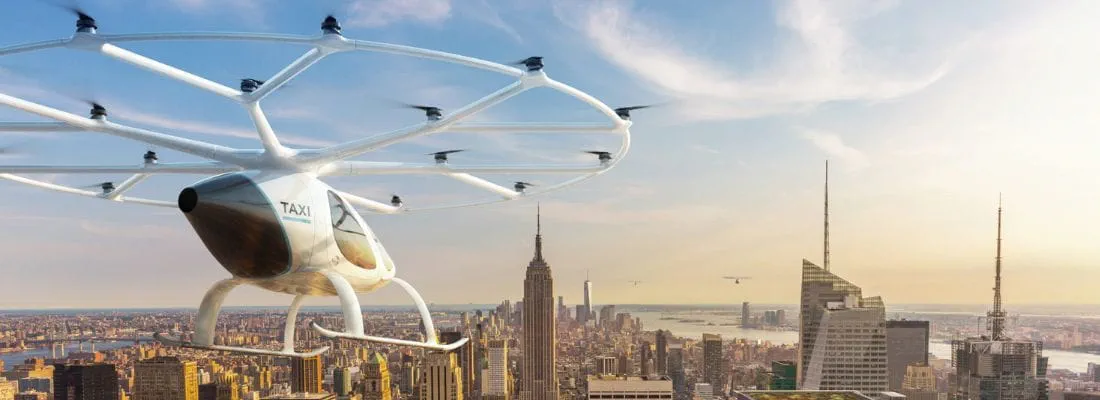Carlo van de Weijer is managing director of the newly founded Eindhoven AI System Institute EAISI at Eindhoven University of Technology. He advises ministries and industries around the world on the future of mobility and is a member of the supervisory board of several high-tech companies and start-ups. For Amsterdam Drone Week he talks about future mobility and explains the role of unmanned aviation.
Van de Weijer, who has a master’s degree in mechanical engineering from the TU Eindhoven and a PhD degree with honours from TU in Graz, carries a broad experience in the automotive industry with executive positions at Siemens and TomTom. He has argued for years that mobility will not so much change through smarter infrastructure, but rather through smarter vehicles. “The way we travel is changing very fast. And when we talk about smart mobility we’re actually talking about smart elements on a not too smart infrastructure. Cars are getting smarter and smarter, but the roads they ride on are still the same as 50 years ago. In my view, infrastructure should therefore be an independent platform that is easily adaptable to new technology.”
Van de Weijer compares it to the internet. “It was able to settle into our daily lives so quickly because it initially made use of a 200-year-old technique: the copper wire, which was also used by telephony. The same is happening with mobility. What strikes me is that smarter vehicles are also changing the face of cities. Faster than I expected.”
Further and faster
Despite the fact that everyone seems to realise by now that we need to use much less fossil fuel, Van de Weijer does not believe that people will change their travel behaviour. “Firstly, because I don't see it happening that we want to compromise on comfort. But also because people have been mobile for about an hour a day for many years. That seems evolutionarily determined. Travelling an hour a day makes us happy. What has changed is the distance we travelled in that hour. We keep going further and faster. So I don't believe we're going to travel less. We will have to do it smarter and less polluting.”
“Aviation will solve environmental problems of today”
Van de Weijer doesn't believe that trains will play a significant rolw in smarter and less polluting travel of the future . “Investing in trains to stop the growth of aviation is like investing in newer and faster video recorders because video streaming is using too much energy. We should make video streaming more sustainable! Aviation, and especially short distance aviation, is the fastest growing way of transport. I am convinced that in the future it will be the most sustainable way of transport. Mainly because of two technologies: electric flying for shorter distances and sustainable, clean and circular fuels for long distance aviation. It will happen in the next 30 years and we should put all our efforts into it to make that 29 years of even sooner That will solve most of the environmental problems we face today. Building new infrastructure for trains costs so much energy, materials, CO2 and resources, apart from the operational costs, that it will cost us more than investing in cleaner aviation. And like I said before. We shouldn’t invest in more or other infrastructure but in smarter vehicles.”
The end of traffic jams
Despite his belief in aviation as a means of transport of the future, Van de Weijer does not think that this development will mean the end of traffic jams. “If it means that thousands of drones will soon be flying over the city during rush hour, I don't know whether that is such a good development. I would favour congestion above that. What I foresee is an increase in regional air mobility. And that is possible with a fixed wing or with eVTOL. Drones are a better alternative for helicopters. But it will remain a niche market for the time being.”
Van de Weijer does not think that multi-modal mobility hubs will play a major role in the mobility of the future. “Although the idea has been around for a long time and keeps popping up time and again, it clashes with the fact that people don't like switching modality during a journey. It’s considered a penalty for your comfort. That can only be compensated if you make it very attractive by adding services or making it very cheap. And that conflicts with the fact that those hubs with all the assets needed are pretty expensive. That would be a very hard business case. I would invest in drones but not in hubs.”
Safety first
Traditional aviation often relies on the fact that flying is the safest mode of transport in the world. They have achieved this, among other things, through very strict legislation and regulations and relatively slow and cautious innovation. Van de Weijer believes that flying will remain just as safe now that developments in (unmanned) aviation seem to be increasing exponentially. “I don’t think that things that are flying above our heads are going to be subject to less strict approval rules than we have now. We won’t launch another modality that is less safe than aviation is right now. The biggest societal and economical problem - by far - is the limited safety of transport: people dying or getting injured is really expensive for society, apart from the huge emotional damage. If we can keep flying as safe as it is now it will be the most sustainable way of transport.”
Stay up to date on the latest Innovative Air Mobility development
Join Amsterdam Drone Week for the up-and-coming events.






